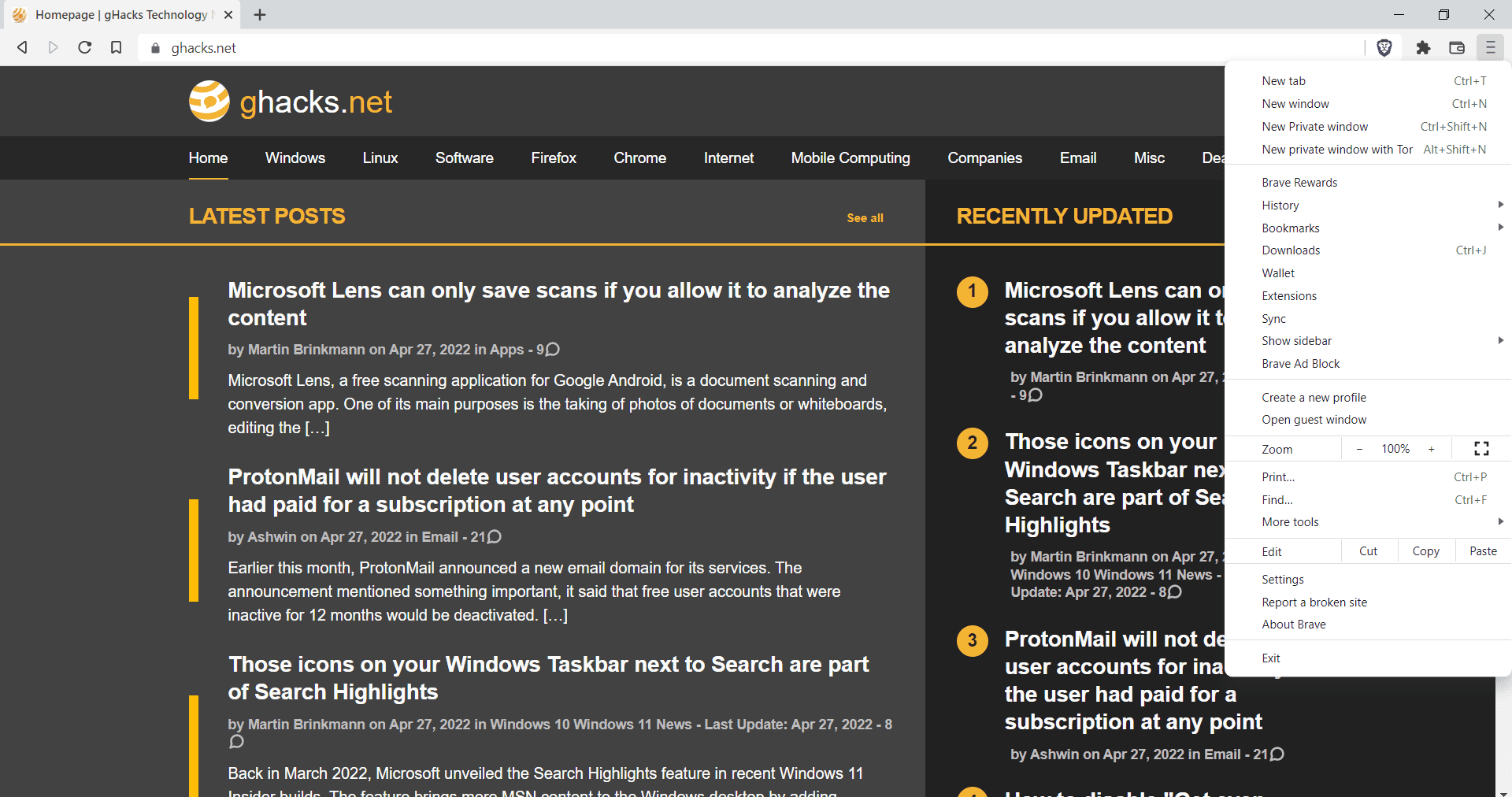@Aluminium @Frankel
Wow, these kinds of a gargantuan quantity of BS. I necessarily mean, I typically reply to remarks even if I take into account them to be stupid, but your things is building even me weary.
> The website hyperlink has some issues, stop spamming people today with it each time somebody dares dilemma the glory that is Google/Brave.
Effectively, if you can not refute any of the blog’s contents, of system the following ideal matter you can do is to attack superficial factors like a personal blog site not conference scientific conditions. Type reminder that this is a non-public website, and I don’t genuinely believe you are interested in these requirements either, it is just the finest you have received at this point.
I imagine the information of the blog site is enough ot advise the huge greater part of buyers of the real stability of browsers, and even even though it consistently comes up even in Firefox message boards and the FF subreddit, nobody has come up with a credible refutation of the actual content material. It is really telling.
And Chromium (and as a result Courageous) staying much more protected than Firefox has very little to do with any intended “glory” (LOL). It is both extra protected, or it is not. I want to discuss the facts and not “glory”.
> The citations are not effectively carried out in any recognizable format. Lots of of the references are from twitter feeds, not research papers.
It’s a non-public website, what do you anticipate? Nevertheless, a exploration paper would explain to you the exact point. We equally know it.
> Many of the men and women quoted operate for Firefox competitors.
How does this render the information and facts incorrect? If it was incorrect, you could refute it. Foolish mudslinging and wanting for excuses on your part.
> He also does not disclose any conflicts of curiosity he may have personally.
He is a developer of Whonix. Do you know what Whonix is? Hint: Whonix has to use Tor, and the Tor Browser Bundle. The Tor Browser Bundle is primarily based on Firefox. So if just about anything, madaidan must be biased toward Firefox.
> He does not disclose his methodology, all his conclusions are theoretical. A credible researcher would disclose these kinds of issues.
It’s a non-public website. And I think you are seeking for excuses since you can not actually refute nearly anything he suggests in actuality.
> He also seems to believe sandboxes are the be-all and finish-all of safety.
No, you ought to in fact read the posting. Though he discusses the sandbox, it is not all the only stage he discusses. Foolish strawman of yours.
> I get Chrome has a vast majority of the market place, like IE did back again numerous yrs ago, but IE did not have just about as a lot of -days in its heyday.
IE in its heyday also supported beneath 10% of the world wide web expectations Chromium supports now. If you don’t support just about anything, this decreases the assault floor of training course. Invalid comparison.
> I disagree with his and your assertion that browser mono-tradition is a great matter just because it has a sandbox.
In the finish, I just enable the superior product gain. Which is it. If Firefox can not contend then it is and should be on its way out. And that Firefox is a lot less protected than Chromium has absolutely nothing to do with browser monoculture, what does Chromium have to do with the foundation security of Firefox’s code? Respond to: Almost nothing.
Chromium is open supply and has to continue being so due to licensing necessities (and due to the fact it benefits from outside the house contributions). Anybody can base their browser on it. I never see a challenge with it being the dominant browser. Chromium derivatives are like Android ROMs and so much, as far as phones are concerned, we have managed with out Linux phones (which is what Firefox is in the browser environment by comparison). There is merely no motive for Linux telephones to exist when Custom made ROMs exist. So it is with Firefox.
> I imagine the creator is much too limited on particulars but just for pleasurable, right here is a url indicating that Firefox is the most protected browser for the reason that of its sandbox.
Nice Firefox advertisement, on the other hand, madaidan addresses this in his blog and the present sandbox implementation is continue to inferior to Chromium’s implementation. I wouldn’t outright get in touch with the content of the post you posted bogus information, mainly because Firefox got improved than it was in advance of, but the headline is certainly misleading at minimum.
> Listed here is another connection explaining the importance of recognizing who is supporting safety researchers to occur up with their conclusions and why methodology and entire disclosure is important.
All over again, you are discussing about the particular person of the security researcher… Why? Just address the points he raises if you imagine you can. And as I reported, because he is a Whonix dev, if everything, he really should be biased in the direction of Firefox. I also question that a task as revered as Whonix would promote Google (they do not, in fact, they are discussing the Chromium open source base, not Google Chrome).
> The original Mandalorian website link is from 2020, two years in the past. He would make the actual very same rants about sandboxes as he does now.
Mandalorian? Genuinely? Trolling the nickname of the Whonix dev since you have zero arguments to offer you against him, that’s pretty pathetic. And sure, in his “rant” (contacting factual information a rant, LOL all over again) he said the same factor in 2020 and is however stating it now simply because the dilemma Nonetheless PERSISTS. Why modify it when it is nevertheless legitimate?
> Your past posts employed the same conditions, albeit with a distinctive summary
No, I under no circumstances post superficial comparisons.
> Use a superior investigated, significantly less biased supply. The German source has a lot less purpose to be biased.
How is it poorly researched? How is it biased (if anything, he need to be biased towards Firefox for the reason that which is what Tor employs)? You just can’t response these concerns oneself.
And the BSI report you posted is not a supply in my viewpoint. It is superficial trash. As I mentioned, they appear at some requirements, e.g. “Does the browser have a sandbox?”. If there is a sandbox, then they check their checkbox and go on. They in no way look at the implementations by themselves in any kind of depth, which is not surprising, since the “comparison” you have posted was carried out by bureaucrats and not builders, and sure, it reveals. Your source has neither believability nor legitimacy simply because it absolutely lacks methodology, it lacks any type of depth, it is just a superficial checklist that you misleadingly submit right here.
@Frankel
Now that I have dealt with the Bs promises from @Aluminium, I can arrive to your uninformed nonsense.
> Lol, nevertheless slipping for madaidan. Calendar year previous stale coffee and links to articles or blog posts from 2015. Actual unsafe stuff there!
The write-up was last current on March 19th, 2022, but Alright, whatsoever you say. If you want to bash the report at minimum get your details straight.
> Reminder about serious specifics:
LOL, all those are your specifics? CVE counting, a process of amateurs that fails to account for the reputation of the computer software attacked and the genuine severity of each individual presented problem? Really? So you are telling me here, that Firefox with its meager 3% industry share attracts considerably less scrutiny and fewer curiosity from the poor men than Chromium with its 80% market share? Is that your argument? If certainly, then how is this associated to the base safety of the true Firefox code? The additional well-known software package will often have far more CVE if the change is as substantial as it is below, this proves nothing at all.
Your next “source” is gorhill’s Firefox promo piece exactly where he claims that the Firefox version of his extension is superior to the Chromium variation of his extension. He ruminates the identified reality that there are better limits on what extensions can do on Chromium, which would contain adblockers. The problem is… A) What does that have to do with browser stability? Like, at all? and B) Why ought to I treatment as a Courageous consumer? Brave has an adblocker, I don’t will need to care about the Chromium version of uBlock Origin and its limits. The native adblocker of Brave does CNAME uncloaking, for example (which gorhill claims his uBO on Chromium lacks). I really don’t give a shit, because why would I?






More Stories
How to share a Spotify playlist on desktop and mobile – Phandroid
An Introduction to Forensics Data Acquisition From Android Mobile Devices
What to Consider When You Switch From Android to iPhone